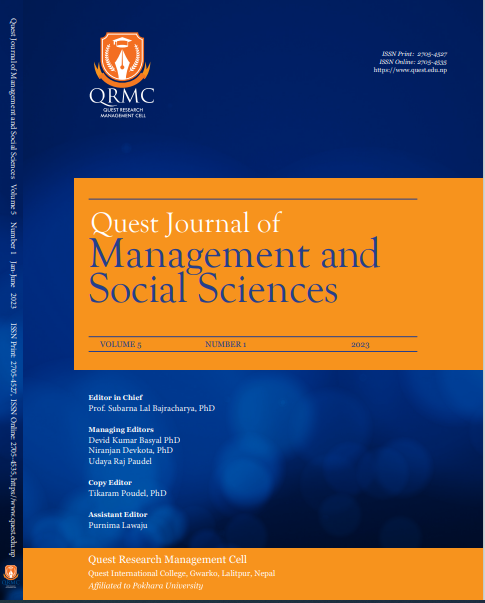Online Gaming Frequency and Student's Academic Performance in the Kathmandu Valley
DOI:
https://doi.org/10.3126/qjmss.v5i1.56296Keywords:
Digital technology, Younger generation, Socialization process, Online gaming frequency, Students' academic performanceAbstract
Background: Digital technology has made a big difference in the lives of younger people, especially students. They socialize through mobile and internet interaction. College-level students spend too much time playing online games to interact with others.
Objective: The study examines the relationship and impact of online gaming on students' academic performance in the Kathmandu Valley.
Design/methodology/Approach: The study has adopted descriptive and causal research designs to deal with the various issues raised in this study. Respondents were BBA-level students in the Kathmandu Valley. We selected four hundred respondents through a purposive sampling technique. Primary data was the main source of information. It was quantitative. The study used a well-structured survey questionnaire to collect the data. We analyzed the data using mean, median, standard deviation, variance, correlation, and regression analysis.
Findings: The analysis indicates that the frequency of online gaming has a certain impact on students' academic performances, although this impact is relatively minor. Moreover, the data reveal that online gaming does affect academic performance in terms of gender.
Conclusion: Concerned institutions need to organize awareness programs to inform of the positive and negative impacts of online gaming frequency to students, parents, and teachers. Teachers can use only educational games to get students involved in the classroom because game apps related to course books are made to test a person's ability to think critically and analyze information so that students can solve more complicated problems. Future researchers can study other factors that affect students’ academic performance with a larger sample size and from a wide area using quantitative data to address the research problem.
Downloads
Downloads
Published
How to Cite
Issue
Section
License
Copyright (c) 2023 Quest Journal of Management and Social Sciences

This work is licensed under a Creative Commons Attribution-NonCommercial-NoDerivatives 4.0 International License.
This license enables reusers to copy and distribute the material in any medium or format in unadapted form only, for noncommercial purposes only, and only so long as attribution is given to the creator.




